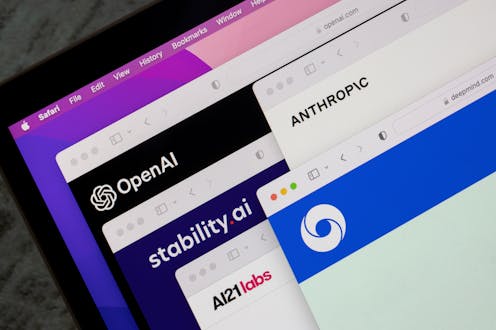Generative AI is making traditional ways to measure business success obsolete
- Written by Kamran Mahroof, Associate Professor, Supply Chain Analytics, University of Bradford

Businesses are already being radically transformed by artificial intelligence (AI). Tools now exist that offer instantaneous, high-quality results in improving certain operations without the burden of high costs or delays. In fact, generative AI could completely upend the traditional ways that we measure success in business.
Generative AI refers to programs that produce high-quality text, images, ideas and even complex software code[1] in response to prompts (questions or instructions) from a user. Applications powered by data-driven algorithms enable users to quickly create high-quality content[2], redefining traditional measures of success.
A small café can generate aesthetically pleasing menus in a few clicks through apps like Jasper.AI[3]. Online retailers can use generative AI chatbots such as botco.ai[4] to provide 24/7 support, answering queries and offering advice.
Businesses with an online presence can use generative AI to analyse social media posts in order to understand customer sentiment. AI empowers businesses by automating tasks like writing marketing copy, crafting social media posts and generating blog articles. Additionally, AI can handle routine customer inquiries, data entry and scheduling, freeing up valuable time for strategic initiatives.
Platforms such as GPT-4[5], GeminiAI[6] and Co-Pilot[7] are either free or affordable, making it easier for even small firms to benefit[8] from high-end capabilities once reserved only for bigger firms with bigger budgets.
Generative AI tools can produce content in close to real time[9], and deliver results without forcing firms to compromise on quality. In fact, the AI tools get better at what they do[10] as they’re exposed to more data.
Businesses operating a family of models known as “as a service” models, can make particular use of generative AI. In one of these, known as content-as-a-service (CAAS)[11], firms provide other organisations with quick access to quality written content and visuals. Once exclusively the domain of humans, these tasks can now be done by AI. Firms operating a software-as-a-service (SAAS) model can also leverage AI given that some programs now generate complex computer code.
Old measures of success
Historically, project management and business success was largely defined through a simple formula:
Cost x Time = Quality.
Often touted as the “iron triangle”[12] from the perspective of operational efficiency, this equation implies that, in order to attain a degree of quality, firms must balance cost with the time spent to achieve that level of quality.
For example, requesting that something be both delivered quickly and at a high quality typically incurs higher costs. Proper planning and scheduling help ensure competitive pricing and reliable quality.
Delivering results faster often translates to investing more resources, such as labour or specialised equipment, adding to overall costs[13]. Conversely, delivering lower cost solutions would often come at the expense of quality.
A related trade off is that of speed versus accuracy[15]. If something needs to be done quickly, accuracy is often compromised[16].
AI has upended this thinking, as firms can now achieve both speed and accuracy at the same time[17] by leveraging AI[18]. This can enhance productivity and drive innovation without losing out on quality.
Likewise, through generative AI, smaller companies[19] with fewer resources are able to rub shoulders and compete with larger firms using AI-powered tools. They can do this by streamlining operations, creating cost-effective marketing content and delivering personalised customer experiences.
This can make existing businesses more efficient, competitive[20] and creative[21]. It can also lower the barriers to entry into markets for prospective small and medium-sized business owners.
Prospects for survival
Many generative AI tools are cloud-based, reducing the need for significant infrastructure costs. They are also user friendly, requiring no specialised expertise. This means that organisations no longer require specialised talent to drive competitiveness within their organisations.
The UK government’s recent autumn budget included a number of tax rises that will hit businesses[22], especially some small and medium-sized enterprises (SMEs) that don’t have the financial buffers to weather severe economic challenges.
Companies may either put recruitment budgets on hold[23], or scale them back[24]. Against the background of such a challenging economic environment, SMEs are using generative AI to transform efficiency and productivity as well as improve accessibility and reduce costs.
Generative AI has reconfigured the Cost x Time = Quality formula and has enabled firms to do things both quickly and accurately without a trade off. For SMEs, it has torn down competitive barriers[25] and the prospects for survival during economic upheaval.
As generative AI continues to develop, companies must be open to embracing change and rethinking how they perceive everything they once held true. Otherwise, they’ll have the wrong horse, for the wrong course.
References
- ^ complex software code (www.oracle.com)
- ^ high-quality content (www.ibm.com)
- ^ Jasper.AI (www.jasper.ai)
- ^ botco.ai (botco.ai)
- ^ GPT-4 (openai.com)
- ^ GeminiAI (gemini.google.com)
- ^ Co-Pilot (copilot.microsoft.com)
- ^ small firms to benefit (hbr.org)
- ^ close to real time (medium.com)
- ^ get better at what they do (medium.com)
- ^ content-as-a-service (CAAS) (simplea.com)
- ^ “iron triangle” (blog.hptbydts.com)
- ^ adding to overall costs (hbr.org)
- ^ Kaspars Grinvalds (www.shutterstock.com)
- ^ speed versus accuracy (pmc.ncbi.nlm.nih.gov)
- ^ quickly, accuracy is often compromised (www.forbes.com)
- ^ at the same time (mitsloan.mit.edu)
- ^ leveraging AI (www.weforum.org)
- ^ through generative AI, smaller companies (hbr.org)
- ^ more efficient, competitive (www.weforum.org)
- ^ creative (hbr.org)
- ^ that will hit businesses (ifamagazine.com)
- ^ put recruitment budgets on hold (www.ft.com)
- ^ scale them back (www.theguardian.com)
- ^ torn down competitive barriers (www.computing.co.uk)







